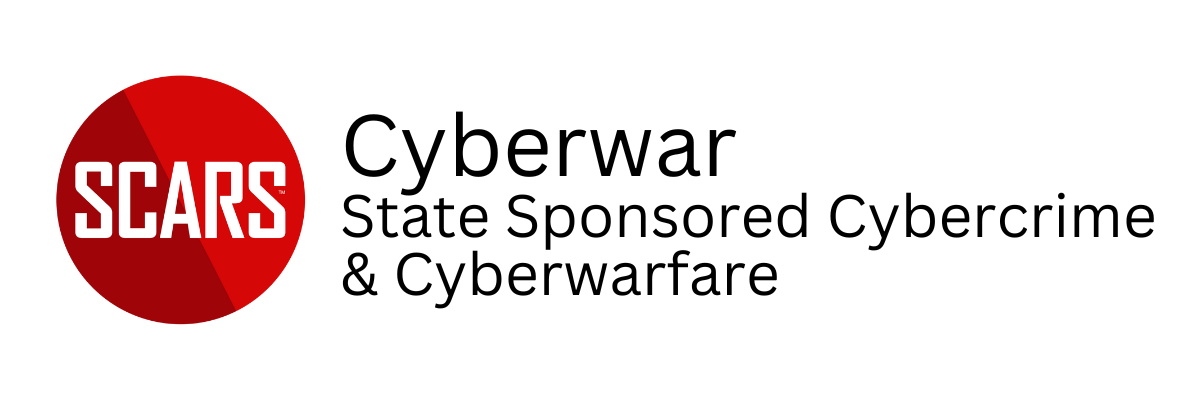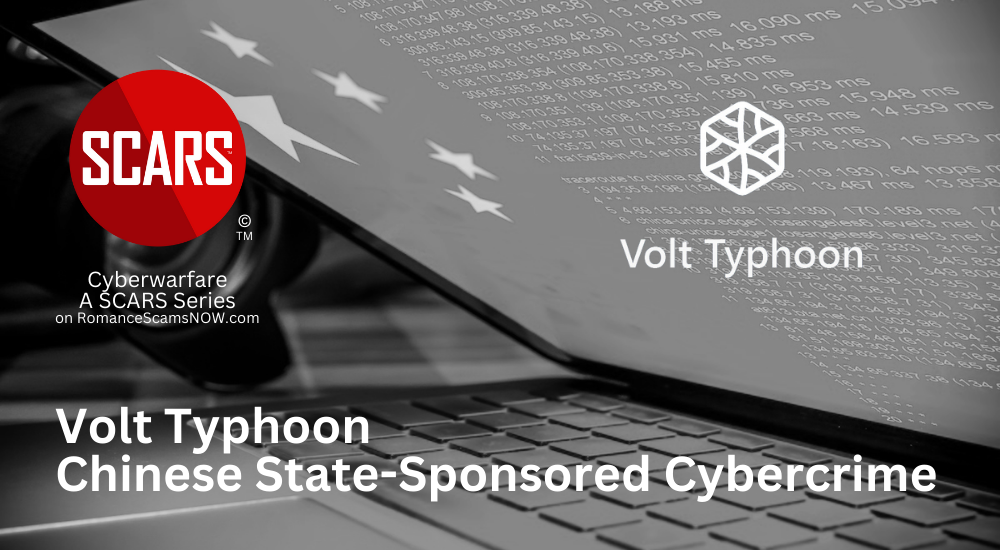Authors:
• SCARS Editorial Team – Society of Citizens Against Relationship Scams Inc.
• Main Article by: Richard Forno, Principal Lecturer in Computer Science and Electrical Engineering, University of Maryland, Baltimore County
• Portions by the United States Cybercrime and Infrastructure Security Agency
Originally Published: March 29, 2024 – Used With Permission
Article Abstract
The United States and its global intelligence partners have issued a warning about the activities of the Chinese state-sponsored hacker group known as Volt Typhoon, which targets critical infrastructure.
With aliases like Vanguard Panda and Bronze Silhouette, Volt Typhoon has compromised numerous devices worldwide, posing a significant threat to sectors such as communications, energy, transportation, and water systems.
Despite denials from China, this group has been actively penetrating internet-connected systems since 2021, using sophisticated tactics to evade detection.
Recent reports highlight the potential for disruptive cyberattacks, prompting urgent calls for enhanced cybersecurity measures and vigilance from infrastructure providers and individuals alike.

Volt Typhoon! A Cybersecurity Expert Explains the Chinese Hackers targeting US critical Infrastructure
Volt Typhoon is a Chinese state-sponsored hacker group. The United States government and its primary global intelligence partners, known as the Five Eyes, issued a warning on March 19, 2024, about the group’s activity targeting critical infrastructure.
The warning echoes analyses by the cybersecurity community about Chinese state-sponsored hacking in recent years. As with many cyberattacks and attackers, Volt Typhoon has many aliases and also is known as Vanguard Panda, Bronze Silhouette, Dev-0391, UNC3236, Voltzite and Insidious Taurus. Following these latest warnings, China again denied that it engages in offensive cyberespionage.
Volt Typhoon has compromised thousands of devices around the world since it was publicly identified by security analysts at Microsoft in May 2023. However, some analysts in both the government and cybersecurity community believe the group has been targeting infrastructure since mid-2021, and possibly much longer.
Volt Typhoon uses malicious software that penetrates internet-connected systems by exploiting vulnerabilities such as weak administrator passwords, factory default logins and devices that haven’t been updated regularly. The hackers have targeted communications, energy, transportation, water and wastewater systems in the U.S. and its territories, such as Guam.
In many ways, Volt Typhoon functions similarly to traditional botnet operators that have plagued the internet for decades. It takes control of vulnerable internet devices such as routers and security cameras to hide and establish a beachhead in advance of using that system to launch future attacks.
Operating this way makes it difficult for cybersecurity defenders to accurately identify the source of an attack. Worse, defenders could accidentally retaliate against a third party who is unaware that they are caught up in Volt Typhoon’s botnet.
Why Volt Typhoon Matters
Disrupting critical infrastructure has the potential to cause economic harm around the world. Volt Typhoon’s operation also poses a threat to the U.S. military by potentially disrupting power and water to military facilities and critical supply chains.
Microsoft’s 2023 report noted that Volt Typhoon could “disrupt critical communications infrastructure between the United States and Asia region during future crises.” The March 2024 report, published in the U.S. by the Cybersecurity and Infrastructure Security Agency, likewise warned that the botnet could lead to “disruption or destruction of critical services in the event of increased geopolitical tensions and/or military conflict with the United States and its allies.”
Volt Typhoon’s existence and the escalating tensions between China and the U.S., particularly over Taiwan, underscore the latest connection between global events and cybersecurity.
Defending against Volt Typhoon
The FBI reported on Jan. 31, 2024, that it had disrupted Volt Typhoon’s operations by removing the group’s malware from hundreds of small office/home office routers. However, the U.S. is still determining the extent of the group’s infiltration of America’s critical infrastructure.
On March 25, 2024, the U.S. and U.K. announced that they had imposed sanctions on Chinese hackers involved in compromising their infrastructures. And other countries, including New Zealand, have revealed cyberattacks traced back to China in recent years.
All organizations, especially infrastructure providers, must practice time-tested safe computing centered on preparation, detection and response. They must ensure that their information systems and smart devices are properly configured and patched, and that they can log activity. And they should identify and replace any devices at the edges of their networks, such as routers and firewalls, that no longer are supported by their vendor.
Organizations can also implement strong user-authentication measures such as multifactor authentication to make it more difficult for attackers like Volt Typhoon to compromise systems and devices. More broadly, the comprehensive NIST Cybersecurity Framework can help these organizations develop stronger cybersecurity postures to defend against Volt Typhoon and other attackers.
Individuals, too, can take steps to protect themselves and their employers by ensuring their devices are properly updated, enabling multifactor authentication, never reusing passwords, and otherwise remaining vigilant to suspicious activity on their accounts, devices and networks.
For cybersecurity practitioners and society generally, attacks like Volt Typhoon can represent an enormous geopolitical cybersecurity threat. They are a reminder for everyone to monitor what’s going on in the world and consider how current events can affect the confidentiality, integrity and availability of all things digital.
Published under Creative Commons license
According to the U.S. Cybercrime and Infrastructure Security Agency:
PRC State-Sponsored Actors Compromise and Maintain Persistent Access to U.S. Critical Infrastructure
The Cybersecurity and Infrastructure Security Agency (CISA), National Security Agency (NSA), and Federal Bureau of Investigation (FBI) assess that People’s Republic of China (PRC) state-sponsored cyber actors are seeking to pre-position themselves on IT networks for disruptive or destructive cyberattacks against U.S. critical infrastructure in the event of a major crisis or conflict with the United States.
CISA, NSA, FBI and the following partners are releasing this advisory to warn critical infrastructure organizations about this assessment, which is based on observations from the U.S. authoring agencies’ incident response activities at critical infrastructure organizations compromised by the PRC state-sponsored cyber group known as Volt Typhoon (also known as Vanguard Panda, BRONZE SILHOUETTE, Dev-0391, UNC3236, Voltzite, and Insidious Taurus):
- U.S. Department of Energy (DOE)
- U.S. Environmental Protection Agency (EPA)
- U.S. Transportation Security Administration (TSA)
- Australian Signals Directorate’s (ASD’s) Australian Cyber Security Centre (ACSC)
- Canadian Centre for Cyber Security (CCCS), a part of the Communications Security Establishment (CSE)
- United Kingdom National Cyber Security Centre (NCSC-UK)
- New Zealand National Cyber Security Centre (NCSC-NZ)
The U.S. authoring agencies have confirmed that Volt Typhoon has compromised the IT environments of multiple critical infrastructure organizations—primarily in Communications, Energy, Transportation Systems, and Water and Wastewater Systems Sectors—in the continental and non-continental United States and its territories, including Guam. Volt Typhoon’s choice of targets and pattern of behavior is not consistent with traditional cyber espionage or intelligence gathering operations, and the U.S. authoring agencies assess with high confidence that Volt Typhoon actors are pre-positioning themselves on IT networks to enable lateral movement to OT assets to disrupt functions. The U.S. authoring agencies are concerned about the potential for these actors to use their network access for disruptive effects in the event of potential geopolitical tensions and/or military conflicts. CCCS assesses that the direct threat to Canada’s critical infrastructure from PRC state-sponsored actors is likely lower than that to U.S. infrastructure, but should U.S. infrastructure be disrupted, Canada would likely be affected as well, due to cross-border integration. ASD’s ACSC and NCSC-NZ assess Australian and New Zealand critical infrastructure, respectively, could be vulnerable to similar activity from PRC state-sponsored actors.
As the authoring agencies have previously highlighted, the use of living off the land (LOTL) techniques is a hallmark of Volt Typhoon actors’ malicious cyber activity when targeting critical infrastructure. The group also relies on valid accounts and leverages strong operational security, which combined, allows for long-term undiscovered persistence. In fact, the U.S. authoring agencies have recently observed indications of Volt Typhoon actors maintaining access and footholds within some victim IT environments for at least five years. Volt Typhoon actors conduct extensive pre-exploitation reconnaissance to learn about the target organization and its environment; tailor their tactics, techniques, and procedures (TTPs) to the victim’s environment; and dedicate ongoing resources to maintaining persistence and understanding the target environment over time, even after initial compromise.
The authoring agencies urge critical infrastructure organizations to apply the mitigations in this advisory and to hunt for similar malicious activity using the guidance herein provided, along with the recommendations found in the joint guide Identifying and Mitigating Living Off the Land Techniques. These mitigations are primarily intended for IT and OT administrators in critical infrastructure organizations. Following the mitigations for prevention of or in response to an incident will help disrupt Volt Typhoon’s accesses and reduce the threat to critical infrastructure entities.
If activity is identified, the authoring agencies strongly recommend that critical infrastructure organizations apply the incident response recommendations in this advisory and report the incident to the relevant agency (see Contact Information section).
SCARS Resources:
- Getting Started Right: ScamVictimsSupport.org
- Sextortion Scam Victims: Sextortion Victims Support – The Essentials (scamvictimssupport.org)
- For New Victims of Relationship Scams newvictim.AgainstScams.org
- Subscribe to SCARS Newsletter newsletter.againstscams.org
- Sign up for SCARS professional support & recovery groups, visit support.AgainstScams.org
- Join our Scam Survivors United Chat & Discussion Group facebook.com/groups/scam.survivors.united
- Find competent trauma counselors or therapists, visit counseling.AgainstScams.org
- Become a SCARS Member and get free counseling benefits, visit membership.AgainstScams.org
- Report each and every crime, learn how to at reporting.AgainstScams.org
- Learn more about Scams & Scammers at RomanceScamsNOW.com and ScamsNOW.com
- Scammer photos ScammerPhotos.com
- SCARS Videos youtube.AgainstScams.org
- Self-Help Books for Scam Victims are at shop.AgainstScams.org
- Donate to SCARS and help us help others at donate.AgainstScams.org
- Worldwide Crisis Hotlines: https://blog.opencounseling.com/suicide-hotlines/
Other Cyber Resources
- Block Scam Domains: Quad9.net
- Global Cyber Alliance ACT Cybersecurity Tool Website: Actionable Cybersecurity Tools (ACT) (globalcyberalliance.org) https://act.globalcyberalliance.org/index.php/Actionable_Cybersecurity_Tools_(ACT)_-_Simplified_Cybersecurity_Protection
- Wizer Cybersecurity Training – Free Security Awareness Training, Phishing Simulation and Gamification (wizer-training.com)
-/ 30 /-
What do you think about this?
Please share your thoughts in a comment below!
Do You Need Support?
Get It Now!
SCARS provides the leading Support & Recovery program for relationship scam victims – completely FREE!
Our managed peer support groups allow victims to talk to other survivors and recover in the most experienced environment possible, for as long as they need. Recovery takes as long as it takes – we put no limits on our support!
SCARS is the most trusted support & education provider in the world. Our team is certified in trauma-informed care, grief counseling, and so much more!
To apply to join our groups visit support.AgainstScams.org
We also offer separate support groups for family & friends too.
Become a
SCARS STAR™ Member
SCARS offers memberships in our STAR program, which includes many benefits for a very low annual membership fee!
SCARS STAR Membership benefits include:
- FREE Counseling or Therapy Benefit from our partner BetterHelp.com
- Exclusive members-only content & publications
- Discounts on SCARS Self-Help Books Save
- And more!
To learn more about the SCARS STAR Membership visit membership.AgainstScams.org
To become a SCARS STAR Member right now visit join.AgainstScams.org
To Learn More Also Look At Our Article Catalogs
Scam & Crime Types
More SCARS
- ScamsNOW Magazine – ScamsNOW.com
- ContraEstafas.org
- ScammerPhotos.com
- AnyScam.com – reporting
- AgainstScams.org – SCARS Corporate Website
- SCARS YouTube Video Channel













Leave A Comment